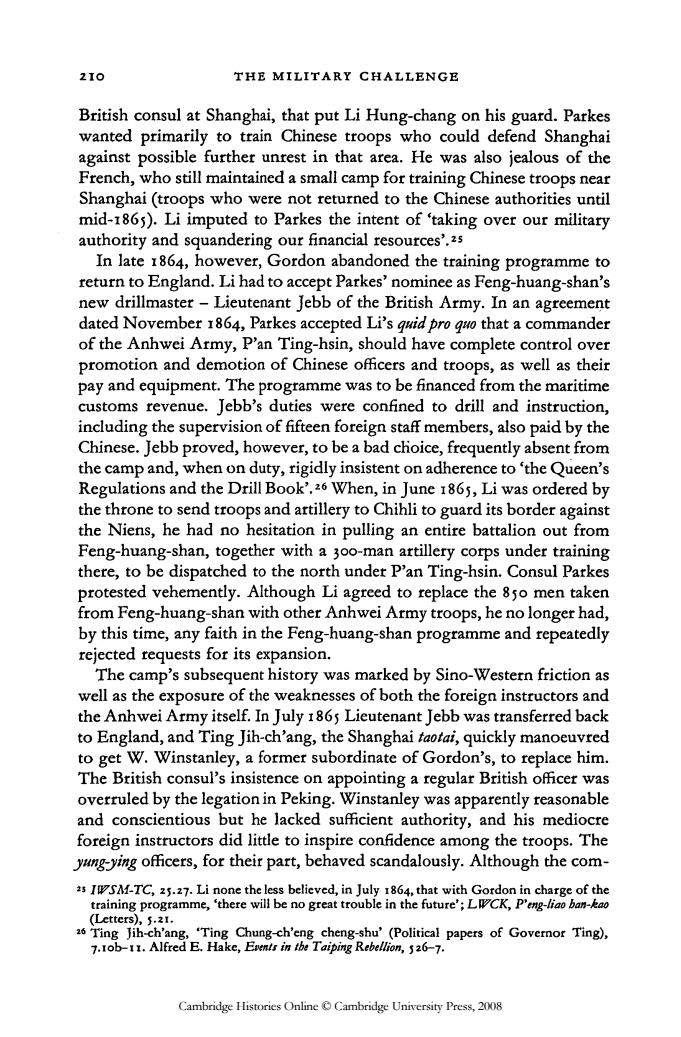正在加载图片...

2I0 THE MILITARY CHALLENGE British consul at Shanghai,that put Li Hung-chang on his guard.Parkes wanted primarily to train Chinese troops who could defend Shanghai against possible further unrest in that area.He was also jealous of the French,who still maintained a small camp for training Chinese troops near Shanghai(troops who were not returned to the Chinese authorities until mid-1865).Li imputed to Parkes the intent of taking over our military authority and squandering our financial resources'.2s In late 1864,however,Gordon abandoned the training programme to return to England.Li had to accept Parkes'nominee as Feng-huang-shan's new drillmaster-Lieutenant Jebb of the British Army.In an agreement dated November 1864,Parkes accepted Li's guid pro guo that a commander of the Anhwei Army,P'an Ting-hsin,should have complete control over promotion and demotion of Chinese officers and troops,as well as their pay and equipment.The programme was to be financed from the maritime customs revenue.Jebb's duties were confined to drill and instruction, including the supervision of fifteen foreign staff members,also paid by the Chinese.Jebb proved,however,to be a bad choice,frequently absent from the camp and,when on duty,rigidly insistent on adherence to 'the Queen's Regulations and the Drill Book'.*6 When,in June 1865,Li was ordered by the throne to send troops and artillery to Chihli to guard its border against the Niens,he had no hesitation in pulling an entire battalion out from Feng-huang-shan,together with a 3oo-man artillery corps under training there,to be dispatched to the north under P'an Ting-hsin.Consul Parkes protested vehemently.Although Li agreed to replace the 8so men taken from Feng-huang-shan with other Anhwei Army troops,he no longer had, by this time,any faith in the Feng-huang-shan programme and repeatedly rejected requests for its expansion. The camp's subsequent history was marked by Sino-Western friction as well as the exposure of the weaknesses of both the foreign instructors and the Anhwei Army itself.In July 1865 Lieutenant Jebb was transferred back to England,and Ting Jih-ch'ang,the Shanghai faotai,quickly manoeuvred to get W.Winstanley,a former subordinate of Gordon's,to replace him. The British consul's insistence on appointing a regular British officer was overruled by the legation in Peking.Winstanley was apparently reasonable and conscientious but he lacked sufficient authority,and his mediocre foreign instructors did little to inspire confidence among the troops.The yung-ying officers,for their part,behaved scandalously.Although the com- s ISM-TC,25.27.Li none the less believed,in July 1864,that with Gordon in charge of the training programme,'there will be no great trouble in the future';LW CK,P'eng-liao ban-kao (Letters),5.21. as Ting Jih-ch'ang,'Ting Chung-ch'eng cheng-shu'(Political papers of Governor Ting), 7.1ob-11.Alfted E.Hakc,Events in the Taiping Rebellion,526-7. Cambridge Histories Online O Cambridge University Press,20082IO THE MILITARY CHALLENGE British consul at Shanghai, that put Li Hung-chang on his guard. Parkes wanted primarily to train Chinese troops who could defend Shanghai against possible further unrest in that area. He was also jealous of the French, who still maintained a small camp for training Chinese troops near Shanghai (troops who were not returned to the Chinese authorities until mid-1865). Li imputed to Parkes the intent of 'taking over our military authority and squandering our financial resources'.25 In late 1864, however, Gordon abandoned the training programme to return to England. Li had to accept Parkes' nominee as Feng-huang-shan's new drillmaster - Lieutenant Jebb of the British Army. In an agreement dated November 1864, Parkes accepted Li's quid pro quo that a commander of the Anhwei Army, P'an Ting-hsin, should have complete control over promotion and demotion of Chinese officers and troops, as well as their pay and equipment. The programme was to be financed from the maritime customs revenue. Jebb's duties were confined to drill and instruction, including the supervision of fifteen foreign staff members, also paid by the Chinese. Jebb proved, however, to be a bad choice, frequently absent from the camp and, when on duty, rigidly insistent on adherence to 'the Queen's Regulations and the Drill Book'.26 When, in June 1865, Li was ordered by the throne to send troops and artillery to Chihli to guard its border against the Niens, he had no hesitation in pulling an entire battalion out from Feng-huang-shan, together with a 300-man artillery corps under training there, to be dispatched to the north under P'an Ting-hsin. Consul Parkes protested vehemently. Although Li agreed to replace the 850 men taken from Feng-huang-shan with other Anhwei Army troops, he no longer had, by this time, any faith in the Feng-huang-shan programme and repeatedly rejected requests for its expansion. The camp's subsequent history was marked by Sino-Western friction as well as the exposure of the weaknesses of both the foreign instructors and the Anhwei Army itself. In July 1865 Lieutenant Jebb was transferred back to England, and Ting Jih-ch'ang, the Shanghai taotai, quickly manoeuvred to get W. Winstanley, a former subordinate of Gordon's, to replace him. The British consul's insistence on appointing a regular British officer was overruled by the legation in Peking. Winstanley was apparently reasonable and conscientious but he lacked sufficient authority, and his mediocre foreign instructors did little to inspire confidence among the troops. The yung-jing officers, for their part, behaved scandalously. Although the com- *» 1WSM-TC, 25.27. Li none the less believed, in July 1864, that with Gordon in charge of the training programme, 'there will be no great trouble in the future'; L.WCK, P'eng-liao ban-kao (Letters), 5.21. 26 Ting Jih-ch'ang, 'Ting Chung-ch'eng cheng-shu' (Political papers of Governor Ting), 7>iob-i 1. Alfred E. Hake, Events in the Taiping Rebellion, 526-7. Cambridge Histories Online © Cambridge University Press, 2008